- Home
- Roald Dahl
James and the Giant Peach Page 6
James and the Giant Peach Read online
Page 6
And what a wonderful instrument the Old-Green-Grasshopper was playing upon. It was like a violin! It was almost exactly as though he were playing upon a violin!
The bow of the violin, the part that moved, was his back leg. The strings of the violin, the part that made the sound, was the edge of his wing.
He was using only the top of his back leg (the thigh), and he was stroking this up and down against the edge of his wing with incredible skill, sometimes slowly, sometimes fast, but always with the same easy flowing action. It was precisely the way a clever violinist would have used his bow; and the music came pouring out and filled the whole blue sky around them with magic melodies.
When the first part was finished, everyone clapped madly, and Miss Spider stood up and shouted, 'Bravo! Encore! Give us some more!'
'Did you like that, James?' the Old-Green-Grasshopper asked, smiling at the small boy.
'Oh, I loved it!' James answered. 'It was beautiful! It was as though you had a real violin in your hands!'
'A real violin!' the Old-Green-Grasshopper cried. 'Good heavens, I like that! My dear boy, I am a real violin! It is a part of my own body!'
'But do all grasshoppers play their music on violins, the same way as you do?' James asked him.
'No,' he answered, 'not all. If you want to know, I happen to be a "short-horned" grasshopper. I have two short feelers coming out of my head. Can you see them? There they are. They are quite short, aren't they? That's why they call me a "short-horn". And we "short-horns" are the only ones who play our music in the violin style, using a bow. My "long-horned" relatives, the ones who have long curvy feelers coming out of their heads, make their music simply by rubbing the edges of their two top wings together. They are not violinists, they are wing-rubbers. And a rather inferior noise these wing-rubbers produce, too, if I may say so. It sounds more like a banjo than a fiddle.'
'How fascinating this all is!' cried James. 'And to think that up until now I had never even wondered how a grasshopper made his sounds.'
'My dear young fellow,' the Old-Green-Grasshopper said gently, 'there are a whole lot of things in this world of ours that you haven't started wondering about yet. Where, for example, do you think that I keep my ears?'
'Your ears? Why, in your head, of course.'
Everyone burst out laughing.
'You mean you don't even know that?' cried the Centipede.
'Try again,' said the Old-Green-Grasshopper, smiling at James.
'You can't possibly keep them anywhere else?'
'Oh, can't I?'
'Well - I give up. Where do you keep them?'
'Right here,' the Old-Green-Grasshopper said. 'One on each side of my tummy.'
'It's not true!'
'Of course it's true. What's so peculiar about that? You ought to see where my cousins the crickets and the katydids keep theirs.'
'Where do they keep them?'
'In their legs. One in each front leg, just below the knee.'
'You mean you didn't know that either?' the Centipede said scornfully.
'You're joking,' James said. 'Nobody could possibly have his ears in his legs.'
'Why not?'
'Because... because it's ridiculous, that's why.'
'You know what I think is ridiculous?' the Centipede said, grinning away as usual. 'I don't mean to be rude, but I think it is ridiculous to have ears on the sides of one's head. It certainly looks ridiculous. You ought to take a peek in the mirror some day and see for yourself.'
'Pest!' cried the Earthworm. 'Why must you always be so rude and rambunctious to everyone? You ought to apologize to James at once.'
Twenty-five
James didn't want the Earthworm and the Centipede to get into another argument, so he said quickly to the Earthworm, 'Tell me, do you play any kind of music?'
'No, but I do other things, some of which are really quite extraordinary' the Earthworm said, brightening.
'Such as what?' asked James.
'Well,' the Earthworm said. 'Next time you stand in a field or in a garden and look around you, then just remember this: that every grain of soil upon the surface of the land, every tiny little bit of soil that you can see has actually passed through the body of an Earthworm during the last few years! Isn't that wonderful?'
'It's not possible!' said James.
'My dear boy, it's a fact.'
'You mean you actually swallow soil?'
'Like mad,' the Earthworm said proudly. 'In one end and out the other.'
'But what's the point?'
'What do you mean, what's the point?'
'Why do you do it?'
'We do it for the farmers. It makes the soil nice and light and crumbly so that things will grow well in it. If you really want to know, the farmers couldn't do without us. We are essential. We are vital. So it is only natural that the farmer should love us. He loves us even more, I believe, than he loves the Ladybird.'
'The Ladybird!' said James, turning to look at her. 'Do they love you, too?'
'I am told that they do,' the Ladybird answered modestly, blushing all over. 'In fact, I understand that in some places the farmers love us so much that they go out and buy live Ladybirds by the sackful and take them home and set them free in their fields. They are very pleased when they have lots of Ladybirds in their fields.'
'But why?' James asked.
'Because we gobble up all the nasty little insects that are gobbling up all the farmer's crops. It helps enormously, and we ourselves don't charge a penny for our services.'
'I think you're wonderful,' James told her. 'Can I ask you one special question?'
'Please do.'
'Well, is it really true that I can tell how old a Ladybird is by counting her spots?'
'Oh no, that's just a children's story,' the Ladybird said. 'We never change our spots. Some of us, of course, are born with more spots than others, but we never change them. The number of spots that a Ladybird has is simply a way of showing which branch of the family she belongs to. I, for example, as you can see for yourself, am a Nine-Spotted Ladybird. I am very lucky. It is a fine thing to be.'
'It is, indeed,' said James, gazing at the beautiful scarlet shell with the nine black spots on it.
'On the other hand,' the Ladybird went on, 'some of my less fortunate relatives have no more than two spots altogether on their shells! Can you imagine that? They are called Two-Spotted Ladybirds, and very common and ill-mannered they are, I regret to say. And then, of course, you have the Five-Spotted Ladybirds as well. They are much nicer than the Two-Spotted ones, although I myself find them a trifle too saucy for my taste.'
'But they are all of them loved?' said James.
'Yes,' the Ladybird answered quietly. 'They are all of them loved.'
'It seems that almost everyone around here is loved!' said James. 'How nice this is!'
'Not me!' cried the Centipede happily. 'I am a pest and I'm proud of it! Oh, I am such a shocking dreadful pest!'
'Hear, hear,' the Earthworm said.
'But what about you, Miss Spider?' asked James. 'Aren't you also much loved in the world?'
'Alas, no,' Miss Spider answered, sighing long and loud. 'I am not loved at all. And yet I do nothing but good. All day long I catch flies and mosquitoes in my webs. I am a decent person.'
'I know you are,' said James.
'It is very unfair the way we Spiders are treated,' Miss Spider went on. 'Why, only last week your own horrible Aunt Sponge flushed my poor dear father down the plug-hole in the bathtub.'
'Oh, how awful!' cried James.
'I watched the whole thing from a corner up in the ceiling,' Miss Spider murmured. 'It was ghastly. We never saw him again.' A large tear rolled down her cheek and fell with a splash on the floor.
'But is it not very unlucky to kill a spider?' James inquired, looking around at the others.
'Of course it's unlucky to kill a spider!' shouted the Centipede. 'It's about the unluckiest thing anyone can do. Look what happened
to Aunt Sponge after she'd done that! Bump! We all felt it, didn't we, as the peach went over her? Oh, what a lovely bump that must have been for you, Miss Spider!'
'It was very satisfactory,' Miss Spider answered. Will you sing us a song about it, please?'
So the Centipede did.
'Aunt Sponge was terrifically fat, And tremendously flabby at that.
Her tummy and waist
Were as soggy as paste -
It was worse on the place where she sat!
So she said, "I must make myself flat.
I must make myself sleek as a cat.
I shall do without dinner
To make myself thinner."
But along came the peach!
Oh, the beautiful peach!
And made her far thinner than that!'
'That was very nice,' Miss Spider said. 'Now sing one about Aunt Spiker.'
'With pleasure,' the Centipede answered, grinning: 'Aunt Spiker was thin as a wire, And dry as a bone, only drier.
She was so long and thin
If you carried her in
You could use her for poking the fire!
' "I must do something quickly," she frowned.
'I want FAT. I want pound upon pound!
I must eat lots and lots
Of marshmallows and chocs
Till I start bulging out all around."
' "Ah, yes," she announced, "I have sworn
That I'll alter my figure by dawn!"
Cried the peach with a snigger,
"I'LL alter your figure -"
And ironed her out on the lawn!'
Everybody clapped and called out for more songs from the Centipede, who at once launched into his favourite song of all: 'Once upon a time
When pigs were swine
And monkeys chewed tobacco
And hens took snuff
To make themselves tough
And the ducks said quack -quack -quacko, And porcupines
Drank fiery wines
And goats ate tapioca
And Old Mother Hubbard
Got stuck in the c -'
'Look out, Centipede!' cried James. 'Look out!'
Twenty-six
The Centipede, who had begun dancing wildly round the deck during this song, had suddenly gone too close to the downward curving edge of the peach, and for three awful seconds he had stood teetering on the brink, swinging his legs frantically in circles in an effort to stop himself from falling over backward into space. But before anyone could reach him - down he went! He gave a shriek of terror as he fell, and the others, rushing to the side and peering over, saw his poor long body tumbling over and over through the air, getting smaller and smaller until it was out of sight.
'Silkworm!' yelled James. 'Quick! Start spinning!'
The Silkworm sighed, for she was still very tired from spinning all that silk for the seagulls, but she did as she was told.
'I'm going down after him!' cried James, grabbing the silk string as it started coming out of the Silkworm and tying the end of it around his waist. 'The rest of you hold on to Silkworm so I don't pull her over with me, and later on, if you feel three tugs on the string, start hauling me up again!'
He jumped, and he went tumbling down after the Centipede, down, down, down towards the sea below, and you can imagine how quickly the Silkworm had to spin to keep up with the speed of his fall.
'We'll never see either of them again!' cried the Ladybird. 'Oh, dear! Oh dear! Just when we were all so happy, too!'
Miss Spider, the Glow-worm, and the Ladybird all began to cry. So did the Earthworm. 'I don't care a bit about the Centipede,' the Earthworm sobbed. 'But I really did love that little boy.'
Very softly, the Old-Green-Grasshopper started to play the Funeral March on his violin, and by the time he had finished, everyone, including himself, was in a flood of tears.
Suddenly, there came three sharp tugs on the rope. 'Pull!' shouted the Old-Green-Grasshopper. 'Everyone get behind me and pull!'
There was about a mile of string to be hauled in, but they all worked like mad, and in the end, over the side of the peach, there appeared a dripping-wet James with a dripping-wet Centipede clinging to him tightly with all forty-two of his legs.
'He saved me!' gasped the Centipede. 'He swam around in the middle of the Atlantic Ocean until he found me!'
'My dear boy,' the Old-Green-Grasshopper said, patting James on the back. 'I do congratulate you.'
'My boots!' cried the Centipede. 'Just look at my precious boots! They are ruined by the water!'
'Be quiet!' the Earthworm said. 'You are lucky to be alive.'
'Are we still going up and up?' asked James.
'We certainly are,' answered the Old-Green-Grasshopper. 'And it's beginning to get dark.'
'I know. It'll soon be night.'
'Why don't we all go down below and keep warm until tomorrow morning?' Miss Spider suggested.
'No,' the Old-Green-Grasshopper said. 'I think that would be very unwise. It will be safer if we all stay up here through the night and keep watch. Then, if anything happens, we shall anyway be ready for it.'
Twenty-seven
James Henry Trotter and his companions crouched close together on top of the peach as the night began closing in around them. Clouds like mountains towered high above their heads on all sides, mysterious, menacing, overwhelming. Gradually it grew darker and darker, and then a pale three-quarter moon came up over the tops of the clouds and cast an eerie light over the whole scene. The giant peach swayed gently from side to side as it floated along, and the hundreds of silky white strings going upward from its stem were beautiful in the moonlight. So also was the great flock of seagulls overhead.
There was not a sound anywhere. Travelling upon the peach was not in the least like travelling in an aeroplane. The aeroplane comes clattering and roaring through the sky, and whatever might be lurking secretly up there in the great cloud-mountains goes running for cover at its approach. That is why people who travel in aeroplanes never see anything.
But the peach... ah, yes... the peach was a soft, stealthy traveller, making no noise at all as it floated along. And several times during that long silent night ride high up over the middle of the ocean in the moonlight, James and his friends saw things that no one had ever seen before.
Once, as they drifted silently past a massive white cloud, they saw on the top of it a group of strange, tall, wispy-looking things that were about twice the height of ordinary men. They were not easy to see at first because they were almost as white as the cloud itself, but as the peach sailed closer, it became obvious that these 'things' were actually living creatures - tall, wispy, wraithlike, shadowy, white creatures who looked as though they were made out of a mixture of cotton-wool and candyfloss and thin white hairs.
'Oooooooooooooh!' the Ladybird said. 'I don't like this at all!'
'Ssshh!' James whispered back. 'Don't let them hear you! They must be Cloud-Men!'
'Cloud-Men!' they murmured, huddling closer together for comfort. 'Oh dear, oh dear!'
'I'm glad I'm blind and can't see them,' the Earthworm said, 'or I would probably scream.'
'I hope they don't turn round and see us,' Miss Spider stammered.
'Do you think they would eat us?' the Earthworm asked.
'They would eat you,' the Centipede answered, grinning. 'They would cut you up like a salami and eat you in thin slices.'
The poor Earthworm began to quiver all over with fright.
'But what are they doing?' the Old-Green-Grasshopper whispered.
'I don't know,' James answered softly. 'Let's watch and see.'
The Cloud-Men were all standing in a group, and they were doing something peculiar with their hands. First, they would reach out (all of them at once) and grab handfuls of cloud. Then they would roll these handfuls of cloud in their fingers until they turned into what looked like large white marbles. Then they would toss the marbles to one side and quickly grab more bits of cloud and start ov
er again.
It was all very silent and mysterious. The pile of marbles beside them kept growing larger and larger. Soon there was a truckload of them there at least.
'They must be absolutely mad!' the Centipede said. 'There's nothing to be afraid of here!'
'Be quiet, you pest!' the Earthworm whispered. 'We shall all be eaten if they see us!'
But the Cloud-Men were much too busy with what they were doing to have noticed the great peach floating silently up behind them.
Then the watchers on the peach saw one of the Cloud-Men raising his long wispy arms above his head and they heard him shouting, 'All right, boys! That's enough! Get the shovels!' And all the other Cloud-Men immediately let out a strange high-pitched whoop of joy and started jumping up and down and waving their arms in the air. Then they picked up enormous shovels and rushed over to the pile of marbles and began shovelling them as fast as they could over the side of the cloud, into space. 'Down they go!' they chanted as they worked.
'Down they go!
Hail and snow!
Freezes and sneezes and noses will blow!'
'It's hailstones!' whispered James excitedly. 'They've been making hailstones and now they are showering them down on to the people in the world below!'
'Hailstones?' the Centipede said. 'That's ridiculous! This is summertime. You don't have hailstones in summertime.'
'They are practising for the winter,' James told him.
'I don't believe it!' shouted the Centipede, raising his voice.
'Ssshh!' the others whispered. And James said softly, 'For heaven's sake, Centipede, don't make so much noise.'
The Centipede roared with laughter. 'Those imbeciles couldn't hear anything!' he cried. 'They're deaf as doorknobs! You watch!' And before anyone could stop him, he had cupped his front feet to his mouth and was yelling at the Cloud-Men as loud as he could. 'Idiots!' he yelled. 'Nincompoops! Half-wits! Blunderheads! Asses! What on earth do you think you're doing over there!'
The effect was immediate. The Cloud-Men jumped round as if they had been stung by wasps. And when they saw the great golden peach floating past them not fifty yards away in the sky, they gave a yelp of surprise and dropped their shovels to the ground. And there they stood with the moonlight streaming down all over them, absolutely motionless, like a group of tall white hairy statues, staring and staring at the gigantic fruit as it went sailing by.

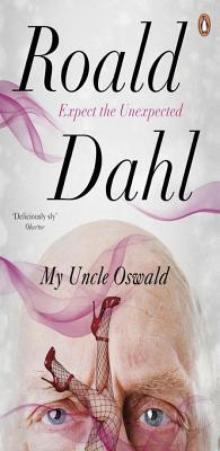 My Uncle Oswald
My Uncle Oswald The Best of Roald Dahl
The Best of Roald Dahl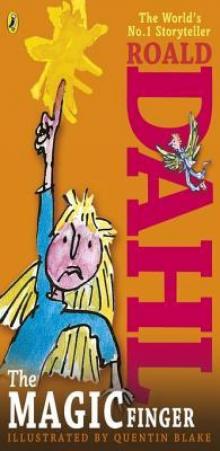 The Magic Finger
The Magic Finger Charlie and the Chocolate Factory
Charlie and the Chocolate Factory Fantastic Mr Fox
Fantastic Mr Fox Matilda
Matilda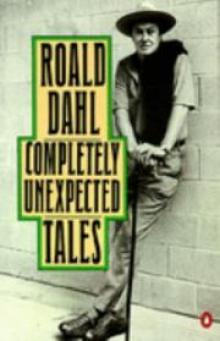 Completely Unexpected Tales: Tales of the Unexpected. More Tales of the Unexpected
Completely Unexpected Tales: Tales of the Unexpected. More Tales of the Unexpected The Wonderful Story of Henry Sugar and Six More
The Wonderful Story of Henry Sugar and Six More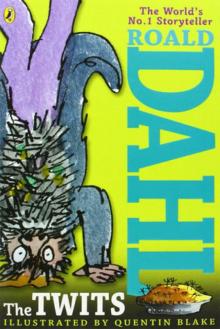 The Twits
The Twits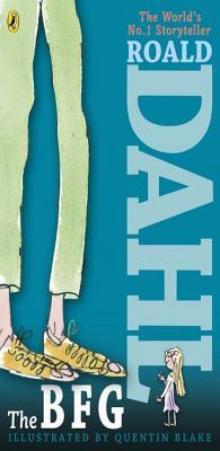 The BFG
The BFG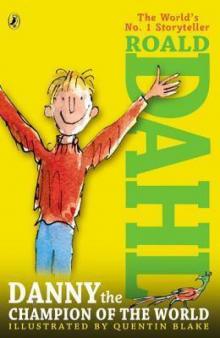 Danny the Champion of the World
Danny the Champion of the World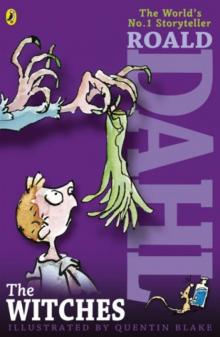 The Witches
The Witches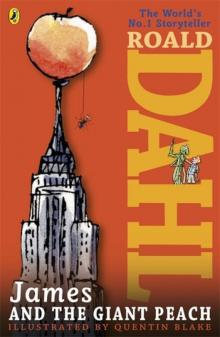 James and the Giant Peach
James and the Giant Peach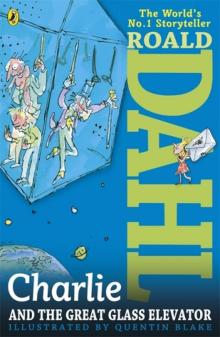 Charlie and the Great Glass Elevator
Charlie and the Great Glass Elevator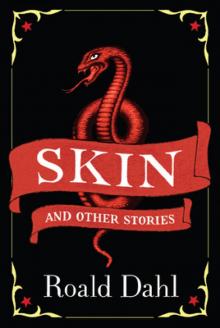 Skin and Other Stories
Skin and Other Stories Kiss Kiss
Kiss Kiss Switch Bitch
Switch Bitch The Giraffe and the Pelly and Me
The Giraffe and the Pelly and Me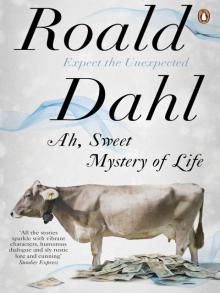 Ah, Sweet Mystery of Life
Ah, Sweet Mystery of Life Fear
Fear The Great Automatic Grammatizator and Other Stories
The Great Automatic Grammatizator and Other Stories Someone Like You
Someone Like You Charlie and the Great Glass Elevator c-2
Charlie and the Great Glass Elevator c-2 More About Boy
More About Boy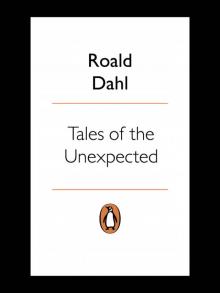 Tales of the Unexpected
Tales of the Unexpected The Umbrella Man and Other Stories
The Umbrella Man and Other Stories Dirty Beasts
Dirty Beasts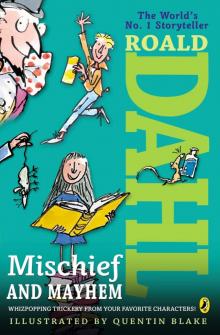 Roald Dahl's Mischief and Mayhem
Roald Dahl's Mischief and Mayhem The Collected Short Stories of Roald Dahl, Volume 1
The Collected Short Stories of Roald Dahl, Volume 1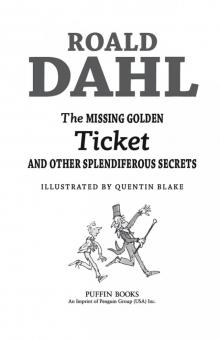 The Missing Golden Ticket and Other Splendiferous Secrets
The Missing Golden Ticket and Other Splendiferous Secrets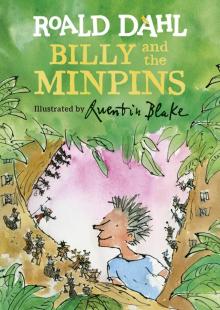 Billy and the Minpins
Billy and the Minpins Over to You
Over to You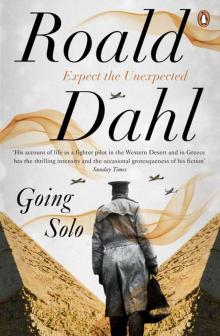 Going Solo
Going Solo Deception
Deception War
War Man from the South ee-3
Man from the South ee-3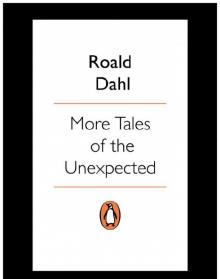 More Tales of the Unexpected
More Tales of the Unexpected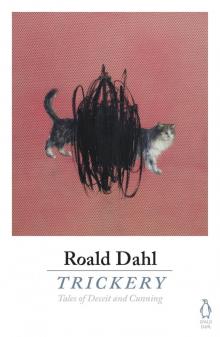 Trickery
Trickery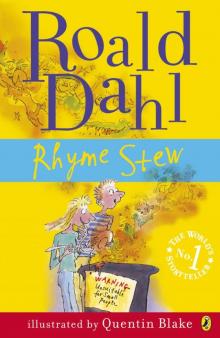 Rhyme Stew
Rhyme Stew Charlie and the Chocolate Factory (Puffin Modern Classics relaunch)
Charlie and the Chocolate Factory (Puffin Modern Classics relaunch)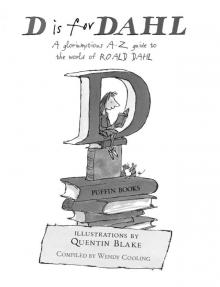 D is for Dahl
D is for Dahl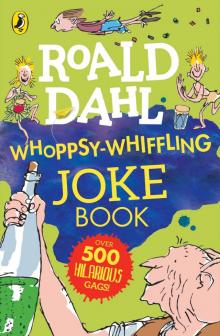 Roald Dahl Whoppsy-Whiffling Joke Book
Roald Dahl Whoppsy-Whiffling Joke Book Spotty Powder and other Splendiferous Secrets
Spotty Powder and other Splendiferous Secrets Charlie and the Chocolate Factory c-1
Charlie and the Chocolate Factory c-1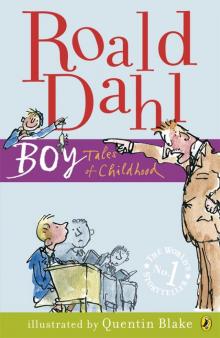 Boy
Boy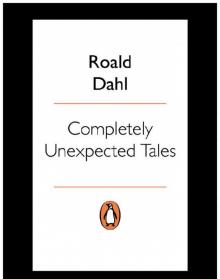 Completely Unexpected Tales
Completely Unexpected Tales Madness
Madness Innocence
Innocence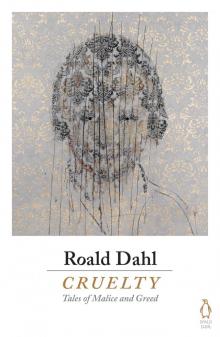 Cruelty
Cruelty George's Marvellous Medicine
George's Marvellous Medicine